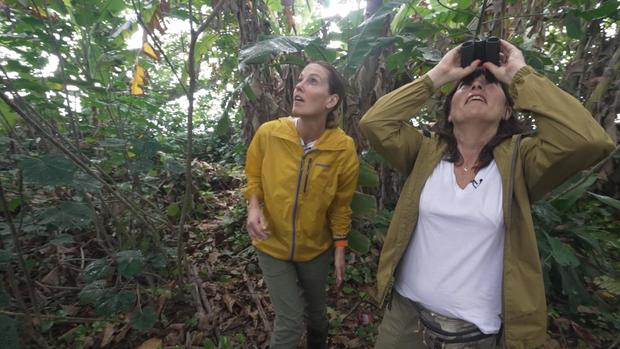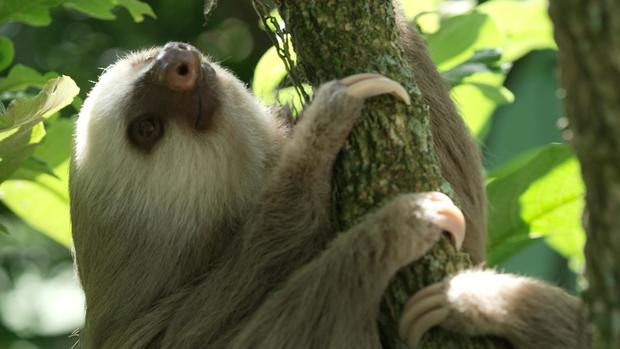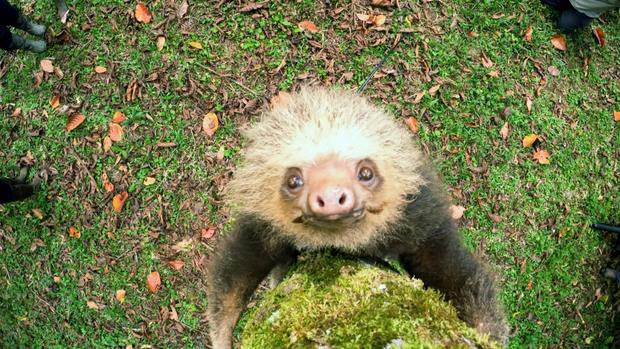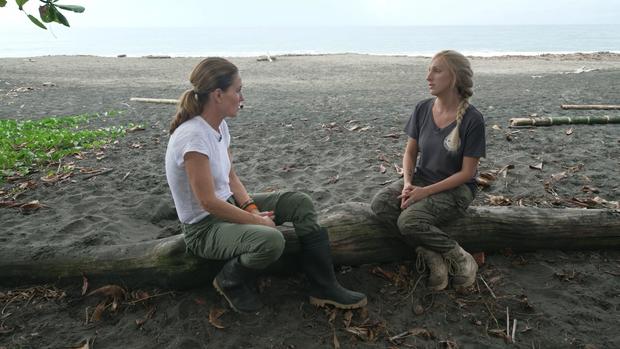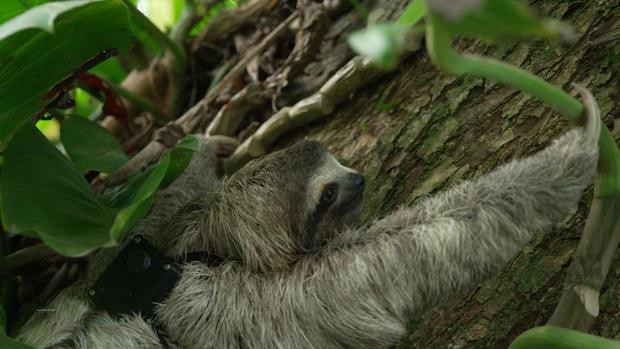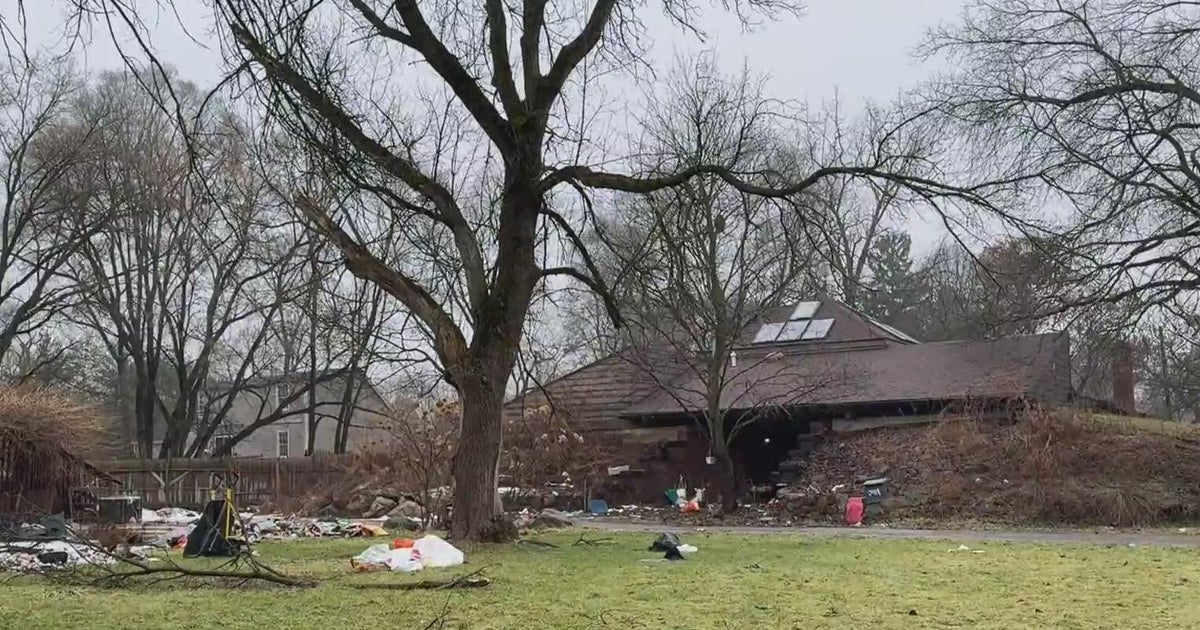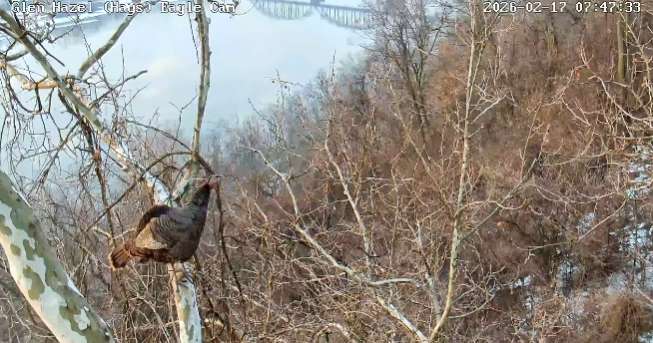Sloths, the world's slowest mammal, turn survival of the fittest upside down
This is an updated version of a story first published on Sept. 24, 2023. The original video can be viewed here.
The stopwatch has long been the symbol of 60 Minutes. But any measure of time is pointless for the subject of our next story: the slow-moving sloth. You might think these distant relatives of the armadillo would make the perfect meal for just about anything faster. And yet, somehow, sloths have been hanging on in one form or another for 64 million years. To understand this quirky animal, 60 Minutes hung out with a quirky zoologist. Lucy Cooke has been documenting the strange lives of sloths for more than 15 years. Cooke was Sharyn Alfonsi's guide on a trip to Costa Rica, where as we first reported in 2023, scientists are making new discoveries about a creature that's turned "survival of the fittest" upside down.Lucy Cooke: This is an area where there are lots of sloths so we do have that on our side.
The first thing we learned about sloths is that it's hard to spot them in the wild. We were warned to keep our eyes on the ground for poisonous snakes…as Lucy Cooke scanned the treetops. The sloth is a master of disguise. It blends into the canopy and can easily be mistaken for a tuft of leaves.
Lucy Cooke: They tend to hunker down when it rains…so making it even harder to see them...
Our luck improved on the beach.
Lucy Cooke: Oh-oh! there's one up there. She--she's in the nook of the tree looking a bit like a termite hump. And she's hunched over, so what we're looking at is her back.
That is not the side of the sloth we went all the way to Central America to see. So Lucy Cooke took us to an animal sanctuary to get a better view of the two species of sloth that live here: the bradypus...and the two toed…
Lucy Cooke: So the two-toed I always say looks like a cross between a Wookiee and a pig. (laughs) 'Cause they've got that sort of beep-able nose. And then these ones have the sort of, you know, Beatles haircuts and-- and Mona Lisa smiles.
Behind that ringer for Ringo, Cooke says, is a secret. Being nature's couch potato is the reason sloths have survived for more than 60 million years in spite, of, well, themselves.
Their eyesight is lousy - their hearing not much better.
In a tree they can move like a tai chi master…to avoid the eyes of hungry birds of prey.
But on the ground, Cooke says gravity removes any shred of dignity. Even with a hurricane strength tailwind, a sloth will top out at a half mile per hour.
Lucy Cooke: the first people that described the sloths, the conquistadors that first observed them, they said terrible things. One said it was the stupidest animal that he'd ever seen. And another said one more defect would-- make its life impossible. And (laughs) they just-- they just didn't understand them, you know?
Cooke says what those early explorers didn't understand…and what is frankly hard to believe when you watch the effort it takes for a sloth just to blink…is that this hairy ninja is uniquely built to survive.
Sharyn Alfonsi: Why so slow? Why do they move so slow?
Lucy Cooke: Because they're saving energy. They're vegetarians. And leaves don't want to be eaten any more than antelope do, right? So they create a lot of toxins. So the sloth can digest those toxins, but only very, very slowly. They don't want to process them fast. And so they're all about burning as little energy as possible.
Sloths spend about 90% of their lives hanging upside down and typically only climb to the ground for bathroom breaks…once a week. With habits like that and nails like this… you can understand why they are solitary creatures…and prefer to be alone…until they don't.
Lucy Cooke: What they do is the females will climb to the top of a tree when they're in heat and scream for sex.
Sharyn Alfonsi: OK. (laughs) So really low key.
Lucy Cooke: Really low key. But they scream in D sharp. Like, that's the-- the-- they make this-- and I'll do it. And I-- he may well on the strength of my impersonation. Let's see if Teddy, who's a boy, looks around--
Sharyn Alfonsi: Swipes right—
Lucy Cooke: --yeah, (laughs) exactly. Let's just see if he g-- OK, I'm gonna (screams) "Whee!" (laughs)
Lucy Cooke: I have actually seen Bradypuses having sex. It's the only thing they do quickly. I mean it was - I was shocked but then afterwards both male and female retreated and had the deepest snooze.
Behind Lucy Cooke's cheeky sense of humor is a hefty resume. She has a master's degree from Oxford and published four books...including two on sloths. She's also hosted wildlife programs for the BBC and National Geographic. The photos Cooke takes on her expeditions have gone viral…leading to donations for conservation and crowds at lectures that mix biology with stand-up.
Lucy Cooke (during a Ted Talk): We humans are obsessed with speed. We idolize animals like the cheetah capable of doing naught to 60 in three seconds flat, well so what?
Sharyn Alfonsi: Are they cute, or are they so ugly they're cute?
Lucy Cooke: Oh no. They're cute surely. But then, I mean, I think a naked mole rat's cute, so you're asking the wrong person. (laughs)
Sharyn Alfonsi: You like a B-list animal.
Lucy Cooke: Yeah bats, hyenas. I mean, is the-- there's a whole list of-- of animals that I think, you know, just have extraordinar-- arily strange and wonderful lives. And-- and just to me just add to the richness of-- of the universe.
Just look how one of those B-list animals can leave Lucy Cooke starstruck.
Lucy Cooke: You guys have got to see this!
As we were making our way through the Costa Rican rainforest, Cooke noticed this. what looks like fluffy golf balls, she realized… was a cluster of something we'd never heard of…the elusive…Caribbean white tent-making bats.
Lucy Cooke: Look they're-they're bats but they're white and they and they live in these leaves. My heart rate is going up…I'm gonna start pouring in sweat and I might start crying actually because its just so…I mean it's just a miracle of evolution. I mean it's just why? Like why?
That sense of wonder has made Lucy Cooke a compelling advocate for sloths. Like them, she looks at the world from a different point of view.
Sharyn Alfonsi: Your latest book is called?
Lucy Cooke: "Bitch." On the-- (laughs) I do apologize. I really like you and your work, but yeah, my book's called "Bitch." (laughs)
In it, Cooke challenges the narrative that in the animal kingdom, males are usually dominant and promiscuous while females are submissive and monogamous. She traveled the world to collaborate with scientists and studied dozens of animals. reporting how killer whale pods are led by post menopausal orcas and how tyrannical matriarchs control meerkat society. Her re-examination flips parts of Charles Darwin's theories upside down.
Lucy Cooke: Charles Darwin's a hero of mine. I studied evolutionary biology. But he was a Victorian man. And so when he came to brand the female of the species, she came out in the shape of a Victorian housewife. Passive, coy, chaste. You know we were sort of-- a feminine footnote to the macho main event basically.
Sharyn Alfonsi: I can hear people saying, "Is this biological wokeness?"
Lucy Cooke: Well, it would be if it wasn't true. You just have to ask the hyena, for example, the-- the female spotted hyena if she's passive and coy, and she'll laugh in your face after she's bitten it off, you know, it's like… (laughs)
Challenging conventional wisdom is a large part of Lucy Cooke's crusade to improve the reputation of sloths.
But there is a more somber kind of rehabilitation she wanted to show us. This is the Toucan Rescue Ranch near Costa Rica's capital Can Jose. They care for sloths nearly killed by power lines.
Sharyn Alfonsi: How are the sloths injured?
Lesley Howle: So most of the time, it's through electrocution, where it'll just look like-- this straight vine, you know, going through the forest. And so they'll grab a hold of that and then become electrocuted.
Lesley Howle was an occupational therapist who started the ranch 19 years ago. Now she has a team of six veterinarians to treat the electrical burns. Millions of years of evolution could not prepare the sloths for human sprawl. But the vets told us they believe the sloths slow metabolism somehow allows them to recover from injuries that might kill other creatures. The Toucan Rescue Ranch also takes in orphans.
Lesley Howle: This is little Gio.
Lesley Howle: And um - this is Marilyn.
Lesley Howle: And then we have Landon here.
Sharyn Alfonsi: Oh, he's a toddler--
Lesley Howle: And-- he's a toddler.
Lesley Howle: And this is our tiniest, little Benji.
Sharyn Alfonsi: OK, now my ovaries have cracked. (laughs)
It can take up to two years for the orphans to be ready to go back into the wild. We watched as a female named Nosara was prepared for release. She was given a final checkup and a tracking collar before getting a lift to a promising tree.
Lucy Cooke: Off she goes.
Sharyn Alfonsi: And if she falls asleep in the middle of the release, (laughs) is that a bad thing?
Lesley Howle: There she goes.
Voices: Oh. Ooh.
Lucy Cooke: That's a scary moment isn't it?
Voices: Oh. Phew.
Sharyn Alfonsi: Mission impossible has nothing on this, like…
With that high drama behind us, we headed down the Caribbean coast with Lucy Cooke to visit another British scientist.
Becky Cliffe is conducting the first population study of sloths, ever. That might seem like low hanging fruit… it is not.
Sharyn Alfonsi: Why is it so hard to get scientific data on sloths?
Becky Cliffe: They've evolved over the last 64 million years to be masters of disguise, right? They are so good at pretending to be coconuts and bird nests, then they're hiding from the very people who are trying to-- trying to help them.
Neither of the sloth species in Costa Rica is officially considered endangered. But Cliffe says her staff is suddenly seeing fewer sloths and some are suffering from an illness she suspects may be related to climate change.
Becky Cliffe: We're getting extreme periods of hot dry weather, and then extreme periods-- of prolonged cold and rain. And that is not what sloths have evolved to survive in. What we're discovering is that the microbes in the sloth's stomach that they use to digest the leaves they eat, when the sloth gets too cold, those microbes die. So even though the sloth might be eating and looking well, it's not digesting its food properly. So they're losing energy and they're getting very weak.
Sharyn Alfonsi: It sounds like they're starving to death but with a full stomach.
Becky Cliffe: That's exactly it. It's a really strange phenomenon that I think only happens in sloths. But it's happening here.
For Cliffe to collect data – she has to collect sloths. That's the full time job for her colleague, Dayber Leon. He climbed barefoot up a three-story high tree covered in biting ants, snatching the sloth, then lowering it in a bag.
Lucy Cooke: Come on little one. Hi
Sharyn Alfonsi: That's impressive. So do you have to do that every time you want to get a sloth down?
Lucy Cooke: And this is easy, yeah. (laughs)
The stuffed sloth she is holding is not a gimmick. It was used to comfort the real one, as we helped replace a memory chip in a tiny backpack the sloth wears.
Sharyn Alfonsi: Oh, you're very strong
Becky Cliffe: Very strong. And then lean her back a little bit. Come on, sweetie.
Sharyn Alfonsi: Gosh, this is like dressing a baby.
Lucy Cooke: Done. Wam-bam.
Sharyn Alfonsi: What kind of information does this give you?
Becky Cliffe: We collect a lot of-- manual data, in terms of what type of tree she's in, how high in the tree she is. There's also a data logger inside here, which collects a lot of information about her behavior. So even her micro body movements are being recorded inside there.
Lucy Cooke: Here we go. Yeah, that's a girl.
Thirty two sloths will get backpacks and be returned, slowly, to the wild. Lucy Cooke told us she hopes this study will provide a deeper understanding of an animal we can be too quick to judge.
Sharyn Alfonsi: What can we learn from the sloth?
Lucy Cooke: We can learn how to be more slow and sustainable ourselves, because we need to. You know, we're destroying this planet at-- an alarming rate. And part of that is because of our addiction to speed and convenience, so if we took a few carefully, slowly, digested leaves out of the sloth's book, you know, we might save this beautiful planet and all of the amazing creatures that live on it.
Produced by Guy Campanile. Associate producer, Lucy Hatcher. Broadcast associate, Elizabeth Germino. Edited by Craig Crawford.

